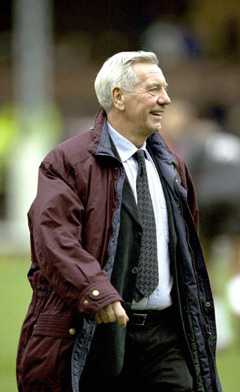England are busy in the attempt to win the World Cup for only the second time, but Johnny Haynes, who will be 70 on Sunday and was 22 times captain of England, is convinced it ought to have been for the third time, if not the fourth.
 |
|
Johnny Haynes of Fulham and England |

In 1958, though England did not still metaphorically rule the world, as they had for much of the first half of the century, they had a formidable team.
Then, horrifically on Feb 6, came Manchester United's air crash at Munich. Among the eight players who perished were three pillars of the national side: left-back Roger Byrne, the massively talented Duncan Edwards at left-half and centre-forward Tommy Taylor.
In the previous 11 matches there had been one defeat and a goal aggregate of 34-11.
"If we hadn't lost those three," Haynes reflected, "I'm sure we would have gone at least very close, quite probably have won."
Haynes was the arch exponent of an ultimately doomed breed: the midfield playmaker, a master-passer around whom the team revolved. Crouched over the ball like a potter, he possessed a two-footed creative touch and eye that, in my opinion, surpassed that of even Martin Peters, Glenn Hoddle and Paul Gascoigne.
His international contemporaries were Didi of Brazil, Suarez of Spain, Kopa of France and a little later, Rivera of Italy. It was the ruse of Bill Nicholson, assistant to manager Walter Winterbottom, to have Bill Slater of Wolves marking man-for-man on Didi that neutralised Brazil in the first round in Sweden, England going out to the Soviet Union in a play-off.
"I loved getting the ball," Haynes said, still as dapper as in his days as a Brylcreem-boy.
"I was always shouting for it, the more the better. I didn't have to think about control."
No idle boast. I played against him for a representative England senior schools team, he in an FA Youth XI, and you marvelled at the precocity of this 16-year-old, who almost uniquely seemed to play without having to look at the ball.
A north London schoolboy who was passionate about Arsenal, he had already signed as an apprentice with Fulham, for no better reason than that Tosh Chamberlain, his closest pal, had done so the previous year.
In 20 seasons he played more than 700 matches before retiring in 1970, continuing a further mellow five years in South Africa.
Did he not yearn for grander surroundings than the Cottage? "Staying was not a good thing, I suppose, but I was happy and anyway there was no chance under the old retain transfer system." - finally legally broken by George Eastham, another playmaker, at Newcastle.
When the derided maximum wage, then £20 per week, was abolished, comedian Tommy Trinder, Fulham's chairman with an eye for publicity, immediately announced Haynes would be the first on £100 per week.
"I think he instantly regretted it, but he had to live with it," a smiling Haynes recalled.
That was 1961. A year later England were at the World Cup finals again, in Chile; camped at a British mining company's quarters half way up a mountain outside provincial Rancagua. In 17 prior matches they had lost only twice, Jimmy Greaves and Co scoring 63 goals to 21 against.
"That was one of the most disappointing experiences of my life," Haynes said. "Chile wasn't ready for the Cup, our accommodation was out of the way because Walter had been criticised for having stayed in Gothenburg city centre four years earlier.
The crowds were tiny and after we lost the opening game to Hungary, the team were dispirited. Then we beat Argentina, but there was no strategic plan for the third game against Bulgaria. If we'd gone for a win we'd have avoided Brazil in the quarter-finals. Instead, we were content to qualify with a tame draw."
With the fortunes to be earned, does Haynes wish he was playing today? "I'd love to, not for the money, which never bothered me, but for the perfect pitches and the scope they now provide. In our day pitches, either deep with mud or bare after a few weeks, made the ball like a tennis ball. I feel there are players around today who could not have coped back then."